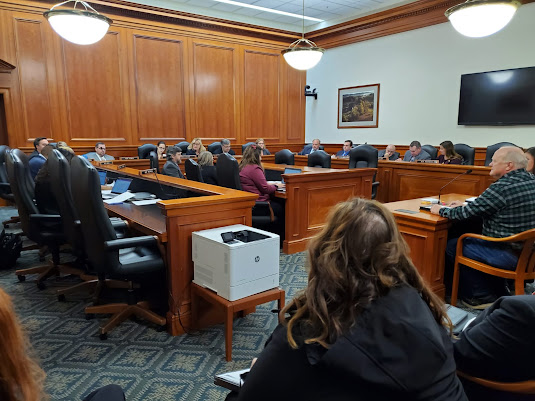TAPPING FROM THE PROCEEDINGS OF THE MICHIGAN STATE HOUSE OF REPRESENTATIVES’ COMMITTEE ON AGRICULTURE – MY MSU EXPERIENCE
The visit to the State House Office Building, Lansing, Michigan State to observe proceedings of the House of Representative Committee on Agriculture on Wednesday, October 30, 2019 was an eye opener. The Agriculture Committee is a standing committee of the Michigan House of Representative, made up of 17 members, with over 50% females. The Committee has among other responsibilities the mandate to deliberate on State House legislations and State Senate Agricultural sector related bills, involving appropriation. Request for us to participate in the proceedings with observer status was made prior to the date and granted. Preparatory Legislative activities before the session started were orderly and cordial, with minimal bureaucracy and security checks. Notice of the meeting was circulated through the media, including internet sources. The Agenda was distributed to interested members of the public outside the Legislative Chamber. It included Senate Bills, Substitutes for Senate and House Bills to be considered, with details of the relevant sections to be reviewed by the Committee. Also circulated was a legislative, non-partisan analysis of the targeted bills and their fiscal impact on the citizens, industry, State and Local Government Councils.
Observers, other participants (including invited industry representatives and members) were seated and official proceedings commenced. Feedback was collated using request cards completed before and during the session. There was provision of drinks and snacks for members of the committee and accredited participants. In all, seven Senate Bills (174, 179, 180, 181, 182, 183 and 361), on the livestock industry were considered. A cursory review of the Bills, revealed alignment of State policies with Federal legislations and inputs of the industry were prioritized. Many of the bills were centered on public welfare, food safety, product handling and nutrition. Considerable emphasis was placed on varietal livestock identification and intra-state movements. Michigan State maintains a livestock database, detailing owners’ names, current location of animals and their species. Movements of crop and animal species are contingent on approval of the designated officials and issuance of inter-state health certificates. Emphasis of the Veterinary Department is placed on zoonotic diseases, particularly livestock tuberculosis and brucellosis. A key issue was the provision of idemnity for slaughtered or destroyed livestock due to reportable animal diseases and toxicology contamination. Livestock policy coverage is wide, covering domesticated livestock, wild and exotic animals. In addition, considerable emphasis is placed on animal rights. Battery cage system is being phased out in favour of cage free housing. Optimum care of animals requires that birds enjoy their natural lifestyle. It is believed that intensive confinement compromises food safety ( for example, eggs from hens in battery cages are associated with higher rates of food borne pathogens, including Salmonella). For implementation, adequate grace period is given the affected industry operators to adjust to the approved policy. For instance, poultry farmers in Michigan were given 10 years grace to upgrade their facilities and align with the Cage Free System. From the institutional angle, designated thematic Directors are appointed to address peculiar issues, with the mandate to report directly to the State Governor. This procedure has the benefits of minimizing bureaucracy and promptly redressing emergency situations. The Designated Directors also have powers to reach agreement with State, Federal and other relevant institutions in emergency situations. The Director of the Michigan Department of Agriculture and Rural Development for instance, has the mandate to notify the Governor of a determination that a disease or condition in animals in Michigan poses an extraordinary emergency to the animal industry. The state also has in place a Commission on Agriculture and Rural Development, which reviews recommendations from the Ministry or critical issues. Interestingly, policy recommendations are shared through the media, with the counties and industries for a specific duration of time, to solicit their inputs before being finalized. Worthy of note, is the Freedom of Information Act for the Agriculture Sector and its limitations. It provides for the confidentiality of medical or epidemiological information. For instance, reporting animal disease outbreaks and contamination with toxic substances are confidential and subject to key conditions, including owners’ consents, unless when necessary to protect public health. Generally, the high media publicity for bills including the use of internet sources deepened participation and provided opportunities for close interaction with legislators in the House and Senate, with implications for agricultural policy ownership and sustainability. Comparing the development trajectory of states in America and states in developing countries, states in Nigeria, particularly Niger State can tap from best practices from the Michigan State Agricultural Policy making process. The next step for Niger State is to support and build on its existing agricultural policy making process through advocacy, capacity building and experience sharing.
By: Dr Ayodeji Alexander Coker Department of Agricultural Economics & Farm Mgt. Federal University of Technology, Minna, Niger State, Nigeria.
This work is made possible by the generous support of the American people through the United States Agency for International Development (USAID) under the Feed the Future initiative through the Nigeria Agricultural Policy Project, Associate Cooperative Agreement Number AJD-620-LA-15-00001. The contents are the responsibility of the authors and do not necessarily reflect the views of USAID or the United States Government. Copyright © 2019, Michigan State University, and the International Food Policy Research Institute. All rights reserved. This material may be reproduced for personal and not-for-profit use without permission from but with acknowledgment to MSU, and IFPRI. Published by the Department of Agricultural, Food, and Resource Economics, Michigan State University, Justin S. Morrill Hall of Agriculture, 446 West Circle Dr., Room 202, East Lansing, Michigan 48824.





Comments
Post a Comment